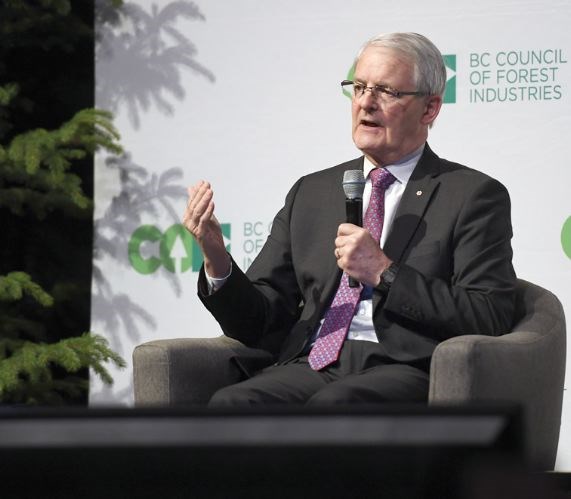The federal Minister of Transport, Marc Garneau, also happens to be the chair of the Cabinet Committee on Canada-United States Relations. He was the first keynote speaker at the Council of Forest Industries (COFI) conference in Prince George just as it was announced from Washington that the two countries and Mexico had suspended formal NAFTA (North American Free Trade Agreement) talks in favour of a more expedited government-to-government set of meetings.
"There is an increase in the momentum at the moment," Garneau said.
"The United States seems to want to fast-track it a little bit. We've indicated that we are prepared to work at a faster pace. At the same time, we still have what we consider to be our priorities within the NAFTA agreement and working at a faster pace does not mean in any way we are changing the arguments that we are presenting on behalf of Canada."
The Citizen asked Garneau if there was such a thing as going too fast in talks of this nature.
"We have said that if the United States or Mexico wishes to increase the pace of discussions, we are perfectly ready to do that, but it will not change our approach. We're not in this to meet some deadline, we are in this to have a good deal for Canada and hopefully one that's good for all three countries."
The setting for Garneau's discussion was a room devoted to the forest sector. The Prince George Conference and Civic Centre was filled with a who's who of the lumber, construction, pulp and paper, bioenergy and high-tech wood sectors. The biggest forestry export commodity of them all between Canada and the U.S. is softwood lumber. That is undergoing its own set of cross-border dialogue, but it is not the same file as NAFTA.
Garneau gave a quick update on the softwood lumber agreement that has expired and is in a state of argument.
"On softwood lumber we are in the middle of dispute resolution," under a NAFTA and World Trade Organization process.
"We've done this four times before over the years, and we have always won, and we feel we're going to win again this time because the same arguments apply."
Lumber has been hit with a 20 per cent fee for crossing into the United States, and some other forestry products have been tariffed as well, but Garneau said there was some softening going on by the American government. He said U.S. administration officials were not the ones driving the impasse.
"It is the U.S. lumber coalition, which has the right of veto on deals. They have not been willing to accept the other negotiations that have gone on with the U.S. administration," Garneau said.
"There is no indication (the American administration is looking to withdraw the complaint against Canadian forestry practices) but we continue to say if you want to come back to the table and sit down and work out a new deal that's acceptable to everybody - and we came close to it before, but the U.S. lumber coalition vetoed it - we are ready to come back to the table anytime. If not, we will take it through the full dispute resolution process."
The Canadian side is confident of a legal victory in this current version of the long-standing spat.
It helps that the American economy is undergoing a surge of construction, which means Canadian lumber is in such high demand that the U.S. construction industry is willing to pay the additional fee to get Canada's wood.
"However, it could be the complete reverse. If the American economy was not as healthy and there wasn't a high demand, we would be in a crisis situation. It really is just a coincidence that we're in a healthy situation and jobs are being maintained," Garneau said.
He also added that no matter what sound-bites might be emerging from the NAFTA momentum, it was important to remember that negotiators - experts in trade arrangements - were the ones doing the work to reach a pact, not politicians.
The COFI convention continues today at the Civic Centre. The morning keynote speaker is Premier John Horgan.



